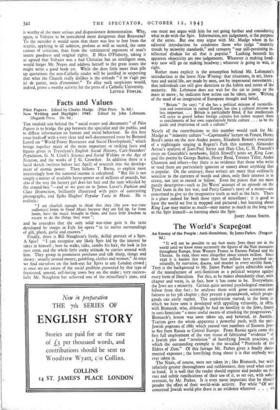Facts and Values
Pilot Papers. Edited by Charles Madge. (Pilot Press. 3s. 6d.)
THE twofold aim behind the " social essays and documents " of Pilot Papers is to bridge the gap between the specialist and the public, and to diffuse information on human and social behaviour. So this first issue leads off with a very clear and well-documented essay by Bernard Lovell on " World Power Resources and Social Development," which brings together many of the more important or striking facts and figures given in Trevelyan's English Social History, Carr-Saunders' Population, G. N. Clark's Science and Social Welfare in the Age of Newton, and the works of J. G. Crowther. In addition there is a lucid sketch (written before last April) of research into the develop- ment of atomic power. Then follows T. Barna, to explain most interestingly how the national income is calculated. " But life is not simply a matter of available horse-power or of millions of pounds, but also of the way the factory girl does her hair and the tune whistled by the errand-boy "—and so we pass on to James Laver's Fashion and Class Distinction, brilliantly illustrated with pairs of contrasting photographs, and Spike Hughes' Popular Taste in Music. He is realistic : " I am churlish enough to think that they (the new war-time audiences) listen to Good Music because they are fed 'up, far from home, have the music brought to them, and have little freedom to escape to do the things they want ";
and he considers that the only solid war-time gain is the taste developed by troops in Italy for opera " in its native surroundings of gilt, plush, garlic and encores."
Finally, there is Bill Naughton's lively, skilful portrait of a Spiv. A Spiv? " I can recognise any likely Spiv kid by the interest he takes in himself ; how he walks, talks, combs his hair, the look in his eyes even, and the whole little cocky attitude he carries around with him. They group in prominent positions and talk sharp, slangy and showy : usually around money, gambling, clothes and women." At once we find ourselves on the look-out for Spivs in any London crowd ; at once we are aware of the social problem presented by this type of frustrated, amoral, self-loving town boy on the make ; very success- fully Mr. Naughton has achieved one of the miscellany's aims, and one must not argue with him for not going further and considering what to do with the Spiv. Information, not judgement, is the purpose of the series. But one may argue with Mr. Madge when in his editorial introduction he condemns those who judge "majority trends by minority standards," and censures " our still-persisting in- tellectual disdain for all that is popular." Lurking beneath his apparent objectivity are two judgements. Whatever is making head- way now will go on making headway ; whatever is going to win, is right.
Rather more explicit is the assumption behind Mr. Lehmann's introduction to the latest New Writing: that situations, in art, litera- ture and social life, are made by men, not by impersonal movements ; that individuals can still give direction to the habits and tastes of the majority. Mr. Lehmann does not wait for the cat to jump or the mass to move ; he indicates how action can be taken, now. Writing of the need of an integration of European thought and belief,
" Britain " (he says) " if she has a political mission of reconcilia- tion and restoration in ruined Europe, has also a cultural mission no less important. . . . Britain is particularly fitted, if her intellectuals will cease to grovel before foreign cultures but rather respect them as enrichments of her own superlatively fertile culture . . . to be the guide and inspiration of such a culture."
Nearly all the contributions to this number would rank for Mr. Madge as " minority culture "—Capetanakis' lecture on Proust, Henry Reed's notes on the new Auden poems, Elizabeth Bowen's evocation of a nightingale singing in Regent's Park this summer, Alexander Astruc's analysis of Jean-Paul Sartre and Huis Clos, C. H. Peacock's essay on Constable's notebooks, Edith Sitwell's notes on King Lear, and the poems by George Barker, Henry Reed, Terence Tiller, Andre Chamson and others—but there is no evidence that those who write or read them are particularly ignorant or snooty about anything that is popular. On the contrary, these writers are more than ordinarily sensitive to the currents of words and ideas, only their interest is to create, not just to record or follow. Even the pieces that are most purely descriptive—such as Jiri Weiss' account of an episode on the Tyrol front in the last war, and Percy Coates's story of a miner—are concerned to give us the imaginative truth as well as the facts. There is a place indeed for both these types of miscellany : it is good to have the world we live in mapped and pictured ; but learning about King Lear may matter as much—may matter as much in the long run to the Spiv himself—as learning about the Spiv.
JANET ADAM SMITH.


























 Previous page
Previous page